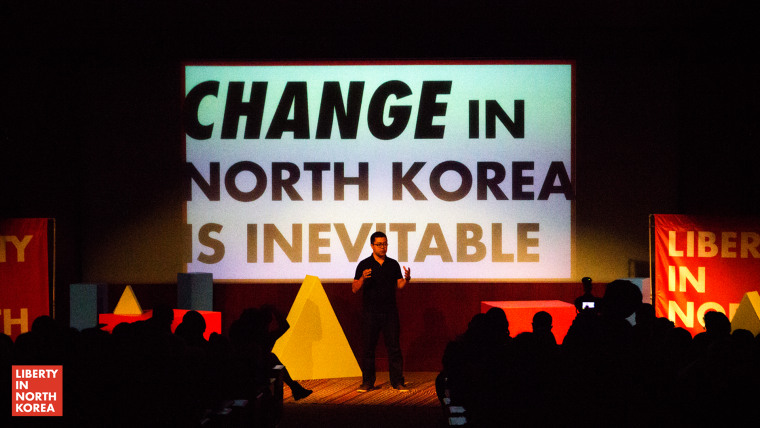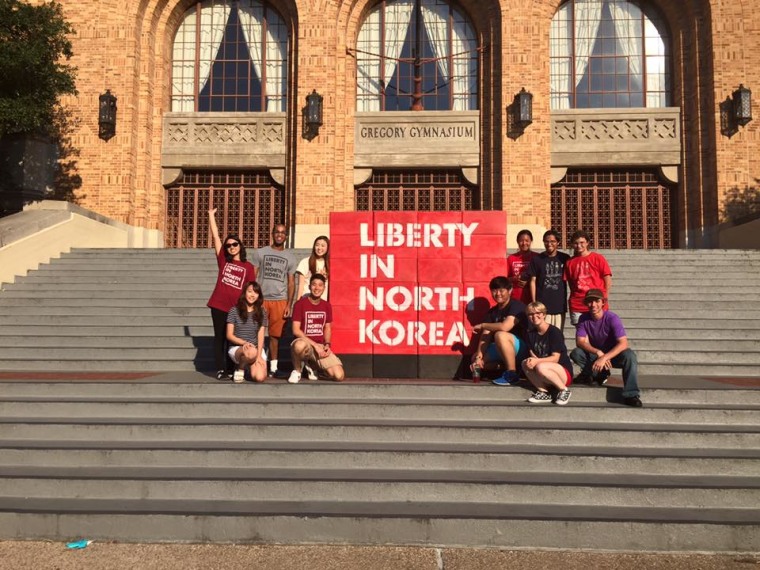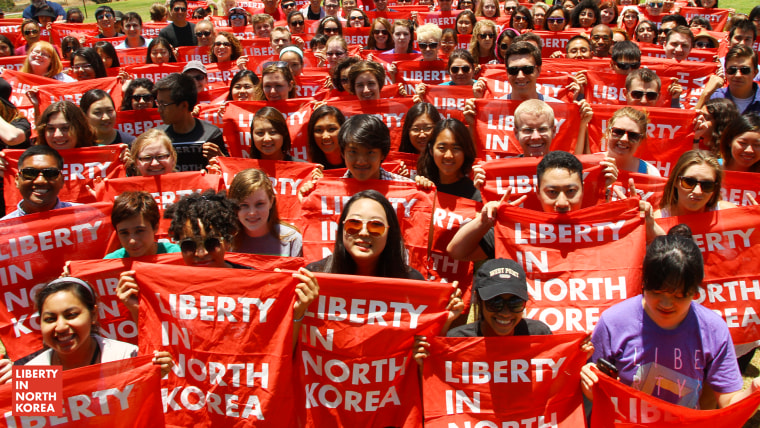Fridays are for fried Oreos — at least they are at the University of Texas at Austin.
On a campus of more than 50,000 students, the UT Austin Rescue Team of Liberty in North Korea (LiNK) hosts a weekly fundraiser to not only put unique treats in the hands of passers-by, but also information about North Korea that often gets erased from global headlines.
“We knew we wanted to do something that people on campus would know us for that was different than the usual bake sale,” Lizzy Barbaree, a marketing major and president of the LiNK Texas chapter, told NBC News. “Most of the time they come up and just want their fried Oreo, and if we ask them if they know [about what life is like in North Korea], they say, ‘Oh, I know about Kim Jong Un.’ When we actually tell them about what people go through and the hardships the North Korean people endure, they’re almost always really surprised and want to know more about what we’re doing to help and what they can do to help too.”
Barbaree, 19, is one of the many college students around the world working with LiNK Rescue Team chapters to educate people about North Koreans’ lives and to raise money to help rescue North Korean refugees.
According to LiNK, there are more than 340 Rescue Teams around the world that have raised nearly half a million dollars to rescue refugees.
“At the end of the day, what we’re working toward is a North Korea where the people have the ability to determine their own futures."
Founded in 2004 at Yale University, Liberty in North Korea is a Los Angeles- and Seoul-based nonprofit that focuses on rescuing North Korean refugees and assisting in their resettlement. (The UT Austin Rescue Team, one of LiNK’s oldest Rescue Teams, was also established in 2004.) According to Hannah Song, president and CEO of LiNK, the organization also aims to approach North Korea “from a holistic perspective,” and not solely through the lens of politics.
“The narrative around North Korea is very heavily around the politics, the nuclear issues ... people have viewed North Korea as sort of a joke — the Dennis Rodman incident, ‘Team America,’ ‘The Interview,’” Song, who's worked full-time for LiNK since 2006, told NBC News. “You have these things where people don’t really take North Korea seriously, and usually what’s missing [from that narrative] are the 24 million North Korean people who live in that country.”
According to the United Nation’s 2014 Commission of Inquiry on Human Rights in the Democratic People’s Republic of Korea, a “wide array of crimes against humanity” have been committed in North Korea, and the country is believed to have the worst record on human rights in the world.
It is also illegal for North Koreans to leave the country without permission from the regime, though stories of escape have been documented in books and films, and shared around the world.
LiNK currently works in various capacities to help refugees while also changing the narrative of how North Korea is talked about in the media: from gathering stories from recently rescued refugees in order to help inform the work of policymakers and journalists, to supporting Rescue Teams’ fundraising efforts.
At UT Austin, Barbaree said their Rescue Team sets a goal to raise $3,000 per semester — the cost to rescue one refugee, which covers transportation and safe passage during the 3,000-plus mile journey from the North Korean border, as well as shelter, food, and other resettlement needs.
Song notes that without an organization like LiNK, which does it work without expectation or requirement of repayment, many refugees end up resettling in debt to brokers who charge individuals for help seeking safety.

“It’s a really important initial opportunity for us to instill a sense of confidence in North Koreans when they first arrive to say, ‘You’ve overcome these incredible challenges and as you begin your new life, there are going to be a lot more challenges, but we want you to know that there are a lot of people here supporting you that are here behind you,’” she said of Rescue Teams' fundraising efforts.
RELATED: How Millennials Are Shaking North Korea's Regime
Since its inception, LiNK has helped more than 400 refugees — and its work, Song said, is far from over. “At the end of the day, what we’re working toward is a North Korea where the people have the ability to determine their own futures,” she said.
In January, LiNK announced it will bring a small group to South Korea made up of top fundraising Rescue Teams. The six-day trip, which is scheduled to take place in the summer of 2016, will provide an opportunity to learn more about LiNK’s work on the ground in South Korea and will also include a visit to the Korean Demilitarized Zone, the “buffer zone” that separates North Korea from South Korea.
“I think what the Rescue Teams do is it provides this really unique outlet and opportunity for someone to say, ‘OK, I’ve seen and I’ve heard and I’ve learned about this stuff, and now I want to do something tangible and something real that can actually make an impact. If I can’t change the situation, at the very least, I can maybe change someone’s life and help one person,’” Song said. “I think it’s really helped to put that into a very practical way in which people can be involved in the issue, as opposed to learning about it and feeling helpless that you can’t do anything.”
LiNK’s fundraising competition for the summer visit to South Korea ends in May, and after winning an early competition in December, UT Austin became the first Rescue Team to secure a spot on the trip.

“We’re so excited for the opportunity,” Barbaree said, adding that, through LiNK, students in Austin have been able to put their desire to help into action. Since 2004, UT Austin’s Rescue Team has rescued 14 refugees through its fundraising efforts, and has also brought North Korean refugees to campus to share their stories of life and of escaping.
“We really mean it when we say that we feel the North Korean people could be free and have rights within our lifetime,” she said. “We truly believe it when we’re doing what we do.”
Follow NBC Asian America on Facebook, Twitter, Instagram, and Tumblr.
